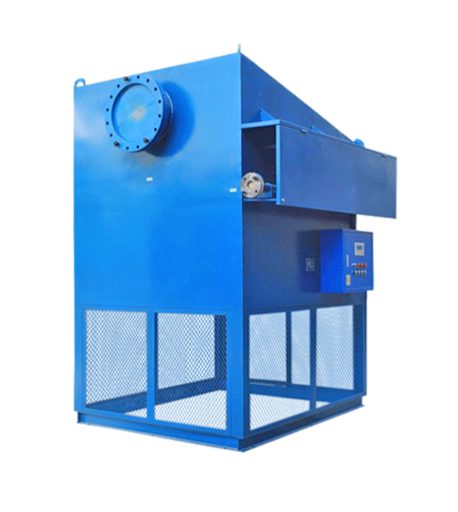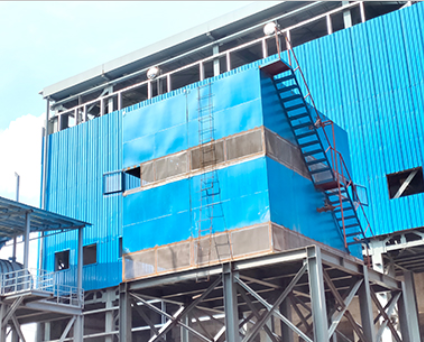What is self-cleaning filter?
The self-cleaning air filter is a new type of high-efficiency air filter with automatic dust cleaning function. It is especially suitable for long-term and continuous air purification of air-using equipment under frequent conditions. It can effectively filter out dust in the production process. The emissions contain fine pollutants.
Self-cleaning dust collectors are used in all types of compressed air stations, especially for multi-stage centrifugal, screw and vane air compressors. The small capacity air compressors can use one dust collector together, and one large capacity air compressor can use one dust collector by itself. Under the negative suction pressure of the compressor, the RH self-cleaning inlet filter draws in ambient air. When the air passes through the high-efficiency filter cartridge, a part of the coarse particles in the airflow settles to the bottom of the filter under the action of gravity and inertia.

The application scope of self-cleaning dust collectors is quite vast and versatile. They are suitable for a diverse range of industries and systems where clean, purified air is a necessity. This includes air compressor stations, where the air needs to be devoid of any impurities before it is compressed and used for various purposes. Oxygen generating stations, another critical area of application, require high purity levels to ensure the oxygen produced is safe and effective for medical or industrial use.
In the realm of heating, ventilation, and air conditioning (HVAC), these dust collectors are invaluable for maintaining the quality of air circulated within the system. This ensures a comfortable and healthy environment, whether in residential, commercial, or industrial settings.
Gas turbines, which play a significant role in power generation, also benefit from the use of self-cleaning dust collectors. The turbines require clean air to function optimally and prevent damage or inefficiency caused by dust or debris.
Similarly, in industries that involve heavy machinery such as blast furnace blowers, the presence of dust and impurities can lead to operational difficulties or even equipment damage. Here, self-cleaning dust collectors play an essential role in maintaining smooth and efficient operations.
The filter media in self-cleaning dust collectors are designed to trap and remove a variety of airborne particles and impurities. These may include dust, pollen, mold spores, and other particulates that could negatively impact the air quality or the functioning of equipment. The self-cleaning feature ensures that the filter remains effective for a longer period, reducing the need for frequent replacements and ensuring consistent air quality.

What is the working principle of self-cleaning air filter?
When aerodynamic equipment inhales air containing dust, it will cause wear and tear on the equipment. The inhaled dust will scale on the surface of the fan blades, causing the dynamic balance imbalance accuracy of the rotor in the equipment to decrease, greatly shortening its working life. Harmful chemical components can cause equipment to rust and corrode. Therefore, aerodynamic equipment must be equipped with high-precision air filters. ZKL series self-cleaning air filters are improved and perfected based on the air intake requirements of similar air compressors at home and abroad. The current product performance fully meets the air intake requirements of industrial gas turbine blast furnace blast air compressors.
Filtration process: Dust-laden air is sucked in from the primary coarse filter box ① by the air compressor, and passes through the high-efficiency filter cartridge ②. Due to the comprehensive effects of gravity inertia, diffusion, contact retention, etc., the dust is adsorbed on the high-efficiency filter cartridge , the clean air enters the Venturi tube ④ through the sealing gasket ③, goes to the clean air chamber ⑤ and merges into the air collection port ⑥, and is then sucked into the air compressor from the clean air outlet pipe ⑦.
Self-cleaning process: After the dusty air is filtered, the dust is adsorbed on the high-efficiency filter cartridge, and the PLC performs the backflush self-cleaning process according to the set time sequence. When the resistance loss value exceeds 600 Pa, the PLC performs the backflush self-cleaning process according to the differential pressure sequence. Control the backflush self-cleaning process (backflush time is 0.1-0.2 seconds). Other high-efficiency filter cartridges work as usual, and dust is blown back and self-cleaned.
What are the advantages of self-cleaning air filter?
Equipment Advantages:
Self-Cleaning Feature: One of the primary benefits of a self-cleaning air filter is its ability to automatically clean itself. This feature significantly minimizes maintenance time, reduces the frequency of filter replacements, and ensures consistent air quality.
Customizable Dust Removal: Depending on the user's requirements, enhancements like a dust box, dust screen, and water flushing dust removal method can be incorporated at the bottom of the unit, effectively addressing secondary pollution issues.
High Degree of Automation: The self-cleaning air filter boasts a high degree of automation, facilitated by the use of imported primary components. This allows for unmanned operation, thereby saving labor costs and enhancing operational efficiency.
High-Quality Materials: The filter is made of superior quality materials, ensuring durability and optimal performance.
Economical Air Consumption: The filter consumes minimal backflushing air, generally ranging between 0.1 to 0.3 cubic meters per minute in the inhalation state. The pressure typically lies between 0.4 to 0.6 Mpa, making the filter energy efficient.
Lightweight and Longlasting: The self-cleaning air filter is lightweight, typically weighing about 1/3 to 1/2 of bag-type filters with the same capacity. This makes it easier to install and handle. In addition, the use of high-quality materials and the self-cleaning feature contribute to a longer lifespan, making it a cost-effective choice in the long run.
The self-cleaning air filter plays a critical role in the industrial field due to several reasons:
Improved Equipment Lifespan: Dust and particulates can cause significant wear and tear on industrial machinery. By ensuring clean and dust-free air intake, these filters can enhance the lifespan and efficiency of the equipment.
Protects Worker Health: In industrial settings, airborne dust and particulates can pose serious health risks to workers. By filtering out these harmful substances, self-cleaning air filters contribute to a safer and healthier work environment.
Cost-Efficient: Self-cleaning air filters reduce the need for frequent filter replacements and maintenance, which can lead to significant cost savings over time. They also lower energy consumption due to less airflow resistance.
Prevents Damage to Products: In industries like food processing or pharmaceuticals, airborne contaminants can compromise product integrity. Self-cleaning air filters ensure the air quality is maintained, preserving the quality of the products.
Minimizes Downtime: The self-cleaning feature allows the filter to clean itself without needing to stop the machine for manual cleaning. This reduces downtime and enhances overall productivity.
High Precision Filtration: Industrial processes often require a high level of purity in their compressed air systems. The high precision filtration provided by self-cleaning air filters helps meet this requirement, ensuring optimal performance.
Environmental Protection: By trapping and containing harmful particles, these filters prevent pollutants from being released into the environment, contributing to environmental protection efforts.







